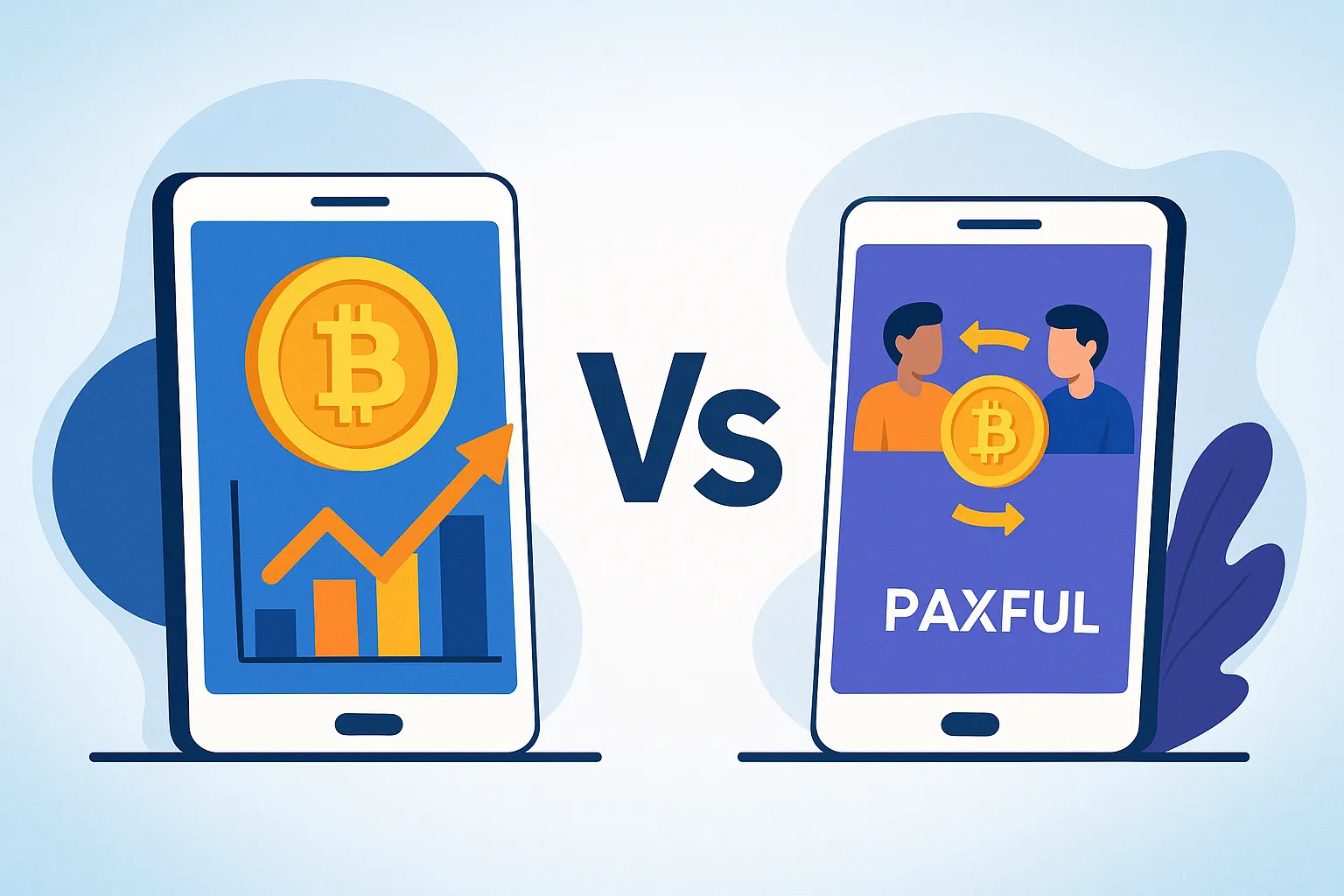In 2025, the crypto exchange landscape is rapidly transforming. With increasing regulatory scrutiny, greater user awareness, and demand for decentralized finance (DeFi) tools, the peer-to-peer (P2P) exchange model has become a go-to structure for crypto entrepreneurs and startups in developing and emerging markets.
Two standout names in the P2P crypto trading ecosystem are LocalBitcoins and Paxful. While LocalBitcoins set the benchmark for Bitcoin-focused P2P trading, Paxful brought diversity, scalability, and a broader payment infrastructure to the model.
As a startup founder or app entrepreneur eyeing the crypto space, understanding the LocalBitcoins vs Paxful business model comparison is crucial for choosing the right framework for your exchange platform in 2025.
This blog will guide you through:
- How both platforms operate
- Their revenue and cost structure
- Key differences and similarities
- Market performance and funding data
- Which business model best suits startup founders today
Let’s begin by unpacking what each platform represents.

What is LocalBitcoins?
LocalBitcoins is one of the original peer-to-peer Bitcoin trading platforms, founded in 2012 in Finland. It enables users to buy and sell Bitcoin directly with each other using various payment methods.
LocalBitcoins functioned as a classified ads-style platform where users listed their offers, set their own prices, and conducted trades directly, with the platform acting as an escrow intermediary to secure transactions.
However, due to increasing regulatory challenges and KYC/AML mandates, LocalBitcoins ceased operations in early 2023, but its model continues to inspire many clones and local market solutions globally.
What is Paxful?
Paxful is a global P2P crypto exchange platform launched in 2015 that allows users to buy and sell Bitcoin, Tether (USDT), and Ethereum with over 350+ payment options, including:
- Bank transfers
- Gift cards
- Online wallets
- Local cash deals
Paxful refined the LocalBitcoins concept by making the user experience smoother, diversifying payment methods, and introducing advanced features like KYC, dispute resolution, and loyalty systems.
The platform experienced exponential growth across Africa, South Asia, and Latin America, regions where access to traditional financial systems is limited.
Business Model of LocalBitcoins
Revenue Streams
- Trading Fees: Charged on every completed transaction (~1% per trade)
- Escrow Fees: Minor fee deducted to hold Bitcoin in escrow
- Merchant Listings: Featured ads for professional traders
- Currency Exchange Spread (where applicable)
Cost Structure
- Platform development & maintenance
- KYC/AML compliance infrastructure
- Dispute resolution and escrow support
- Customer service and moderation
- Legal and regulatory advisory
Key Partners
- Banks and payment gateways
- Crypto wallet providers
- Compliance and KYC vendors
- Regional P2P communities
Growth Strategy
- Focused on Bitcoin-only to maintain simplicity
- Trusted brand built on longevity and transparency
- Operated in over 200 countries before closure
- Lean operations with high repeat usage
Learn More: Business Model of LocalBitcoins : Revenue Model and Features
Business Model of Paxful
Revenue Streams
- Escrow Fees: 1% per successful transaction
- Vendor Tiers: Advanced traders pay for analytics and promo tools
- Affiliate Program: Paxful earns a commission on referred users
- Value-added Services: Paxful Pay for merchants, Paxful Wallet, loyalty bonuses
Cost Structure
- Global support and compliance staff
- Technology stack (app, web, wallet integrations)
- 24/7 dispute resolution center
- Fraud detection and prevention
- Marketing in crypto-first and emerging markets
Key Partners
- Blockchain analysis firms
- Mobile money platforms
- Local crypto communities
- Developers & wallet providers
Growth Strategy
- Targeting unbanked and underbanked populations
- Offering 350+ payment methods
- Expanding into stablecoin and DeFi integration
- Focus on crypto education via Paxful University
Learn More: Business Model of Paxful : How Paxful Earns Revenue
Comparison Table: LocalBitcoins vs Paxful
| Feature | LocalBitcoins | Paxful |
|---|---|---|
| Launch Year | 2012 | 2015 |
| Supported Cryptos | Bitcoin only | Bitcoin, USDT, Ethereum |
| Revenue Model | Trading fee, ad listing | Escrow fee, affiliate program, vendor tools |
| Payment Methods | 60+ | 350+ |
| Marketplace Model | Classified ads | Marketplace with user profiles |
| Escrow Service | Yes | Yes |
| Regulation Focus | KYC/AML compliant | KYC, regional compliance |
| Global Reach | 200+ countries (before shutdown) | 190+ countries |
| Advanced Features | Minimal | Loyalty rewards, affiliate system |
Pros & Cons of LocalBitcoins Model
Pros
- Simpler operations (Bitcoin-only focus)
- High trust factor due to long-standing presence
- Clean, no-frills interface
- Relatively low operational cost
Cons
- Limited crypto options
- Fewer payment methods
- Minimal user engagement tools
- Regulatory challenges caused shutdown
Pros & Cons of Paxful Model
Pros
- Wide range of payment methods = higher liquidity
- User tiers and loyalty = higher retention
- Broader crypto support
- Better monetization through advanced features
Cons
- More complex operations and user support required
- Higher development and compliance costs
- Fraud risk due to variety of payment methods
- Competitive pressure from newer DeFi solutions
Market Data: Growth, Revenue & Funding
Crypto P2P Market Outlook (2025)
- P2P crypto trading expected to surpass $150 billion in volume annually
- Africa, LATAM, and Southeast Asia remain top growth regions
- Regulatory compliance and financial inclusion are driving innovation
LocalBitcoins Highlights
- Operated for over 10 years
- 29 million trades completed
- Revenue estimate before closure: ~$25M/year
- Known for consistent traffic in Nigeria, Venezuela, Russia
Paxful Highlights
- Over 10 million users
- Trading volume: Over $5 billion to date
- Revenue (2024 est.): $60M+
- Raised $2.4M in seed funding; bootstrapped thereafter
Which Model is Better for Startups in 2025?
In 2025, Paxful-style models offer more adaptability and future potential for startups:
- LocalBitcoins-style platforms are easier to build and maintain but limited in terms of user flexibility and payment options.
- Paxful-style platforms offer diversification, more revenue channels, and broader user appeal, especially in markets where digital wallets, gift cards, and alternative payments thrive.
However, if your market is Bitcoin-centric and you aim for compliance-first lean operations, the LocalBitcoins model still holds relevance as a cloned micro-platform.
Choose LocalBitcoins-Style If…
- You want to launch fast with minimal features
- Your audience primarily trades Bitcoin only
- You’re targeting markets with low regulation barriers
- You value simplicity and low operational costs
Launch your LocalBitcoins Clone App with Miracuves
Choose Paxful-Style If…
- You want diverse payment methods and user engagement
- You’re building for unbanked, mobile-first populations
- You plan to scale globally
- You want to offer multiple cryptos and loyalty tools
Launch your Paxful Clone App with Miracuves
Conclusion
Whether you’re drawn to the lean, Bitcoin-only simplicity of LocalBitcoins or the feature-rich, growth-focused ecosystem of Paxful, one thing is certain:
The future of crypto exchanges is peer-to-peer, secure, and community-driven.
At Miracuves, we specialize in custom P2P crypto exchange development, with clone solutions tailored to your target audience, compliance goals, and monetization plans. From MVPs to multi-crypto platforms, we help you launch smarter and scale faster.
FAQs
1. Is the LocalBitcoins business model still viable after its closure?
Yes, the model is still used in many local P2P exchange platforms. It offers a lean and regulation-friendly structure ideal for Bitcoin-only markets.
2. How does Paxful make money?
Paxful earns through escrow fees, vendor analytics tools, affiliate commissions, and value-added services like Paxful Pay.
3. Can I build a Paxful-style app with Miracuves?
Absolutely. Miracuves provides a Paxful clone equipped with multi-crypto support, payment integrations, loyalty programs, and more — all for just $2899.
4. Which model is better for low-resource startups?
LocalBitcoins-style is better for MVPs and pilot launches due to its simplicity and lower compliance/development needs.
5. Are P2P crypto platforms still legal in 2025?
Yes, but they must comply with KYC/AML regulations in most countries. Miracuves ensures all clone apps are built with compliance-ready modules.








